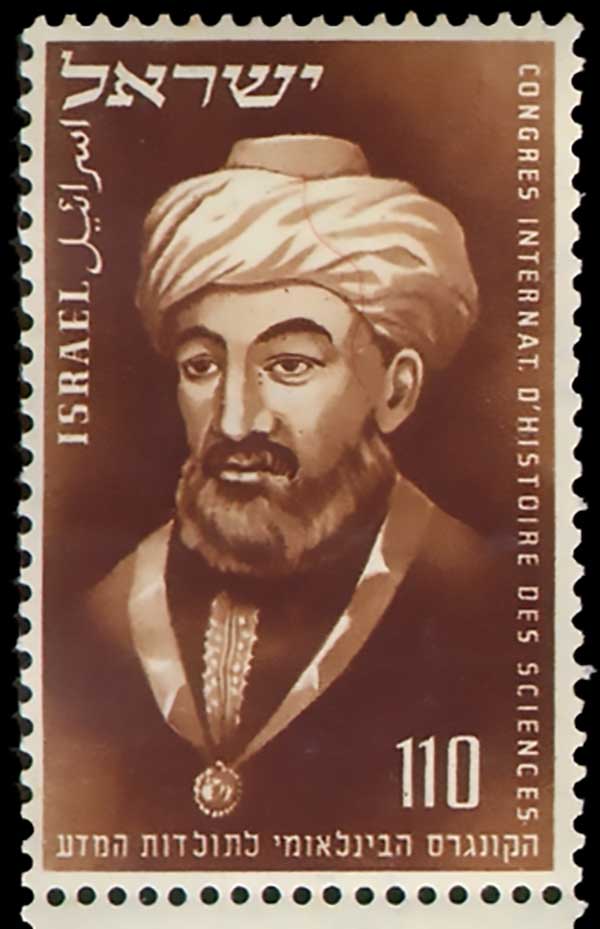Maimonides and Medinat Yisrael
It was the medieval poet-thinker Judah Halevi who famously wrote that though he was in the west, his “heart was in the east.” He was, by legend, killed by an Arab horseman while kneeling to kiss the ground when he first saw the Temple Mount. However, it is not the romantic Halevi but the arch-rationalist Moses Maimonides who actually left the Land of Israel for Egypt, whose thought about the messianic future is still relevant to the modern Zionist project.

As a young man, Maimonides and his family were forced to flee the repressive Almohad Caliphate in his native Spain, landing first in Morocco and passing through the Holy Land before arriving in Egypt, where he settled and thrived. Nonetheless, even in Saladin’s relatively tolerant Egypt, Jews were relegated to a second-class existence as dhimmis. When Maimonides imagined a messianic future in which Jews would again be sovereign in their own land, he wrote with sober realism that “the great advantage is that we will be relieved of the oppression of wicked regimes.” Although Theodor Herzl certainly never read the Mishneh Torah (or Yehuda Halevi for that matter), it was an idea the Zionist founder echoed seven centuries later in fin de siècle Vienna.
The aim of establishing an independent Jewish state forms the centerpiece of Maimonides’s political vision, which crowns the Mishneh Torah, his comprehensive code of Jewish law. Indeed, Maimonides included the belief in this messianic future as one of his famous 13 principles of faith in his Commentary on the Mishnah. In doing so, he concentrated almost entirely on the political facet of return, downplaying the promise of a rebuilt Temple or even the establishment of a legal system based on halakha.
Maimonides places nation-building front and center within his messianic program as outlined in the often-ignored lengthy preface to his 13 principles. There he stipulates that “sovereignty will be re-established in Israel, and there will be a return to Israel . . . and the heart of the kingdom will be in Zion.” National independence, he writes, can only come about by natural means since, “there will be no change in reality from the way it is at present, except that there will be sovereignty in Israel.” Moreover, he advocates political activism rather than the patient “waiting” of the famous anonymously written liturgical version of his 13 principles, the “Ani Ma’amin.”
This measured, realistic messianism foreshadows, to one extent or another, modern Zionism in all its variations. Ahad Ha’am, cultural Zionism’s leading advocate, was thus flatly wrong when he wrote that Maimonides “did not recognize any value to the principle of nationhood.” The concrete achievement of establishing a viable Jewish polity is, in fact, Maimonides’ criterion for authenticating any would-be messiah (a standard that, he noted, invalidated Bar Kokhba as well as Jesus).
Yet there remains what might seem an insurmountable obstacle to seeing Maimonides as a founding father of Zionism. Modern Zionism was, to say the least, a largely secular movement, while Maimonides foresaw a messianic period in which “the entire world will be absorbed with knowing God alone.” Moreover, his messiah was still the king of a theocratic state. Finally, the messianic era he envisioned demanded the globalization of monotheism, which seems to undermine modern ideals of universalism and tolerance. And yet, if we understand what monotheism meant to Maimonides, we will see how the reestablishment of a Jewish state fits within the overarching goals of his religious philosophy.
The Mishneh Torah is far more than a digest of the dos and don’ts of Jewish law. It offers a grand jurisprudential conception of Judaism that recognizes Jews as constituents of both national and global communities. Maimonides’s code opens with a mandate to understand the ideal that lies at the heart of all knowledge, “the foundation of all foundations and the pillar of all sciences.” This is neither a Jewish “foundation” nor are the sciences in question necessarily Jewish “science.” When Maimonides identifies the divine “foundation of all foundations,” he does not use any of the biblical names of God, nor any other divine epithet that might suggest a special relationship with one particular people, rather, he says, we must know that there is a “First Being,” who created all beings. God, for Maimonides, is the ultimate truth in the world and thus accessible to all, subject of course to the limitations of the human intellect. Hence, his demand that God’s existence must be known: the existence of the First Being is the common ground of knowledge for all humanity. For Maimonides, it is the search for the truth, not the practice of Judaism (or any particular religion) that constitutes humanness. God’s relationship to the world is, ultimately, not limited by geography, ethnicity, or established religion, though Jews and Judaism do have a unique role to play as the bearers of monotheistic truth.

Between its universalist beginning in one ultimate truth and its universalist ending in one united humankind, the Mishneh Torah systematically lays out a legal framework of prescribed conduct incumbent on Jews alone. For Maimonides, that legal system is the functional framework best suited for the people of Israel to pursue universal ideals and truths. Though the search for the truth established by that First Being is a sanctioned mitzvah for Jews, it is an imperative for all humanity. Judaism thus serves as a model for the relationship between the particular and the universal. The entire code of law presents a system of Jewish particularism that looks back at its universal origins while, at the same time, anticipating its universal ends. Thus, his code climaxes with an agenda for the messianic era that involves a particular Jewish and a universal human end. The political liberation of a particular people is the first step toward the liberation of humankind, when all will join in the common pursuit of truth.
A close examination of Maimonides’s messianic vision reveals three main components that resonate deeply across the spectrum of Zionist ideologies. The first is purely political: “There will be no distinction between the messianic period and the present except for a relief from foreign subjugation.” History will not end, and it will not be fundamentally transformed. Neither will nature: “One should not think that the customary way of the world will be abolished or that there will be any change in nature, rather the world will go its customary way.” Maimonidean messianism did not depend on supernatural intervention any more than secular Zionism did. Indeed, Maimonides had already rejected what would become the main traditionalist argument against modern Zionism: It was a blasphemous affront against God for not relying on Him alone to effect a return to Zion. If history for Maimonides will not change in the messianic era, neither will human nature. Not even the messiah will have superpowers: “Do not think that the messianic king needs to perform any miracles or change nature or resurrect the dead or other such things that fools talk about.” This second component further deepens Maimonides’s naturalization of the messianic process by distancing it from a literal reading of prophetic texts. He reads Isaiah’s prophecies “the wolf shall dwell with the lamb” or “the babe shall play over a viper’s hole” (Isaiah 11:6, 8) as metaphors for a secure Israel and a peaceful world, but their precise meaning remains open until the messianic era materializes.
Maimonides’s third component is, in a way, the most radical. Although a general belief in a future utopia called the messianic era is a fundamental principle of Judaism, its specific details and exact parameters are not part of that belief. Indeed, Maimonides excludes the messianic era as a theoretical subject of contemplation. Its details, whatever they turn out to be, do not constitute a fundamental principle of belief; we cannot know them through accepted tradition, nor can they be derived through biblical interpretation. In insisting upon this, Maimonides implicitly moved messianism out of the rabbinic study hall and into the realm of politics. States are not built in the beit midrash or willed into existence through doctrinal faith. It is simply impossible for Maimonides’s natural account of the messianic period to ever materialize without the human efforts required for its achievement.
Maimonides also made a sharp distinction between “life in the world to come” and the “days of the messiah.” While the former is a purely spiritual disembodied eternal plane of existence, the latter are “part of this world and the world acts in its customary way except for the restoration of kingship to Israel.”Maimonides thus strategically emphasized the this-worldly nature of the messianic era because he understood the dangers the notion of a “world to come” posed for the activism required to bring about change in “this world.” The reestablishment of a viable Jewish polis and the end of Jewish exile is wholly confined to this world, which can only be realized by human political action. That, of course, is the Zionist enterprise.
And what of Maimonides’ call for a monarchy that appears closer in form to the one he served under Sultan Saladin than to a modern liberal democracy? Even here, a careful reading of Maimonides’ construct of the messianic king really amounts to an ideal non-king. According to Maimonides, what motivates rabbinic messianic longing is the unfettered freedom “to pursue Torah and its wisdom.” It is decidedly not driven by a desire “to rule the entire world, and not so that they would subjugate the nations, and not so that the nations would exalt them.” In fact, he foresees a political environment in which all the social, economic, and geopolitical factors normally necessitating a king’s rule are absent, for “in that time there will be no hunger and no war and no jealousy or rivalry, goodness will be abundant and all luxuries will be as common as earth” (Kings 12:5). In a world where knowledge, wisdom, and truth are society’s overarching concerns, unimpeded by the distractions of hunger, war, jealousy, or rivalry, the messianic king becomes a philosophical figurehead.
It must be remembered that the messianic hopes latent in all Zionism’s forms, whether secular or religious, were also crucial to its success. While cognizant of its “palpable dangers,” the great 20th-century historian Jacob Katz warned that the erasure of messianic sentiments driving the various Zionist ideologies would also be dangerous, for “to blot out the points of reference contained in the messianic myth . . . would impoverish the national consciousness.” In this profound remark, we begin to see that Maimonidean messianism not only foreshadowed modern Zionism, but it also remains a vital resource, a viable alternative to both romantic messianism and arid secularism.
The early debate between secular and religious Zionists over whether to include God in Israel’s Declaration of Independence ended in a compromise reference to the “Rock (tzur) of Israel,” allowing for mutually exclusive understandings of the same phrase: God for the religious and some more natural foundation for the secularists. Yet for Maimonides, who dedicated a chapter in his Guide of the Perplexed to probing the meaning of the Hebrew term tzur, it communicates precisely a point of intersection between the two camps. For Maimonides, tzur signifies the root and principle of everything both when its referent is a human being and when it is God. On the one hand, the Bible metaphorically alludes to Abraham as a rock (Isaiah 51:2), depicting him as the founding model for Israel’s moral and spiritual life. On the other, those verses comparing God to a rock suggest God’s role, not as a parochial legislator but as the “first cause” of all of existence.
The name “Rock of Israel” thus balances between the particular and the universal in the Maimonidean spirit that informs the modern State of Israel at its best: between nation and religion, the human and the transcendent, the birth of a people and the birth of the world.
Politically, Israel has largely resolved the problems of oppression and persecution that were endemic to Jewish exile and powerlessness. The return to Zion is an accessible option for Jews around the globe. Maimonides saw Jewish messianism as an essential stage headed toward a utopian universalism when the “entire world will be exclusively preoccupied with knowing God.” But God, for Maimonides, is the supreme object of wisdom, knowledge of which can only be acquired through a deep understanding of the creation. Maimonides’s Moses, for example, as he is depicted in the Guide of the Perplexed, achieved his singular relationship with God through a profound understanding of God’s creation and the art of governance.
Thus, the kind of God that Maimonides’s messianism contemplates as eventually consuming the thinking of all human beings is precisely the God who is revealed, incrementally, and daily, in modern Israel. Israel’s profound advances in all the disciplines required for understanding the creation across the spectrum of both the sciences and the humanities is Zionism’s realization of Maimonides’s messianic dream. Only the practical end of exilic existence enabled the astonishing scope of this intellectual explosion, for, as Maimonides asserted in his Guide, the misery of living under the domination of foreign powers squelches Jewish potential.
The interminable debate about the virtues and vices of Israel is crassly myopic in its reduction of Israel to nothing but its battle with and treatment of its sworn enemies. The sum of everything modern Israel has achieved in its short life—politically, culturally, philosophically, scientifically, and spiritually—despite its all-consuming security concerns, is astounding. Israel leads the world in research and development spending relative to the size of its economy, with more scientists and engineers per capita than any other country. Israel is at the vanguard of medical innovation and discovery, which is, as has become evident in the present coronavirus crisis, essential to world stability. Even its military training requires intensive familiarity with a code of conduct developed by distinguished moral philosophers that is unparalleled among the nations. As one of those philosophers, the renowned Maimonidean scholar Moshe Halbertal, puts it, “If there is no time for moral reflection in battle, then moral reflection must be accomplished before battle, and drilled into the soldiers who will have to answer for their actions after battle.”
In his introduction to his 13 principles, Maimonides wrote that Jews must be “nation that is a wise and understanding people.” (Deut. 4:6) Insofar as such a statement can be true of an entire nation, the modern state of Israel comes close to fulfilling it. Indeed, the country itself is precisely what Maimonides would have regarded as a miracle: an extraordinarily unlikely event accomplished by entirely natural means. Of course, the final goal of Maimonidean messianism has yet to be achieved. At that time, “the world will be replete with the knowledge of God as the waters cover the seas.”
Comments
You must log in to comment Log In
Suggested Reading
Letters, Summer 2021
Mitzvot and the Modern Dilemma; Tzuris Spoiled?; Hill 24’s Answer; Vilna Gaon, Zionist?

What . . . Him Worry?
How did Abraham Jaffee, raised in the shtetl of Zarasai, became one of MAD magazine's most prolific and recognizable cartoonists?

Tools of Hope: Finding Guidance from Rabbi Ovadiah Yosef
The Jewish muscle-memory that shapes our collective intuition, guides our response to calamity, and gives us hope that we will overcome this, too.
The Future Is Now
Response #3: Edieal Pinker argues from statistics that American Jewry is at an inflection point containing the seeds of a revival.
Brad Rappaport
The Diaspora has thrived for 2,000 years, and Zionism is a product of it, as well as Maimonides himself. Zionism is no solution to the Jewish question, as anti-Zionism that is tinged with anti-Semitism produces violence against Jews and Jewish institutions as well as Israelis. Must we forever listen to nationalist chest-beating that enshrines secular accomplishments as the standard by which Judaism should be measured? Judaism is a religion, and not an ideology. As for Maimonidean universalism, he said that Christianity and Islam, notwithstanding islands of anti-Semitic hostility, brought Torah values to the world, and are on this account to be praised. But modern physics has discredited the notion of a first cause, which derives from Aristotle’s metaphysics, not the Torah, and so any purported universalism to our faith must be found elsewhere.